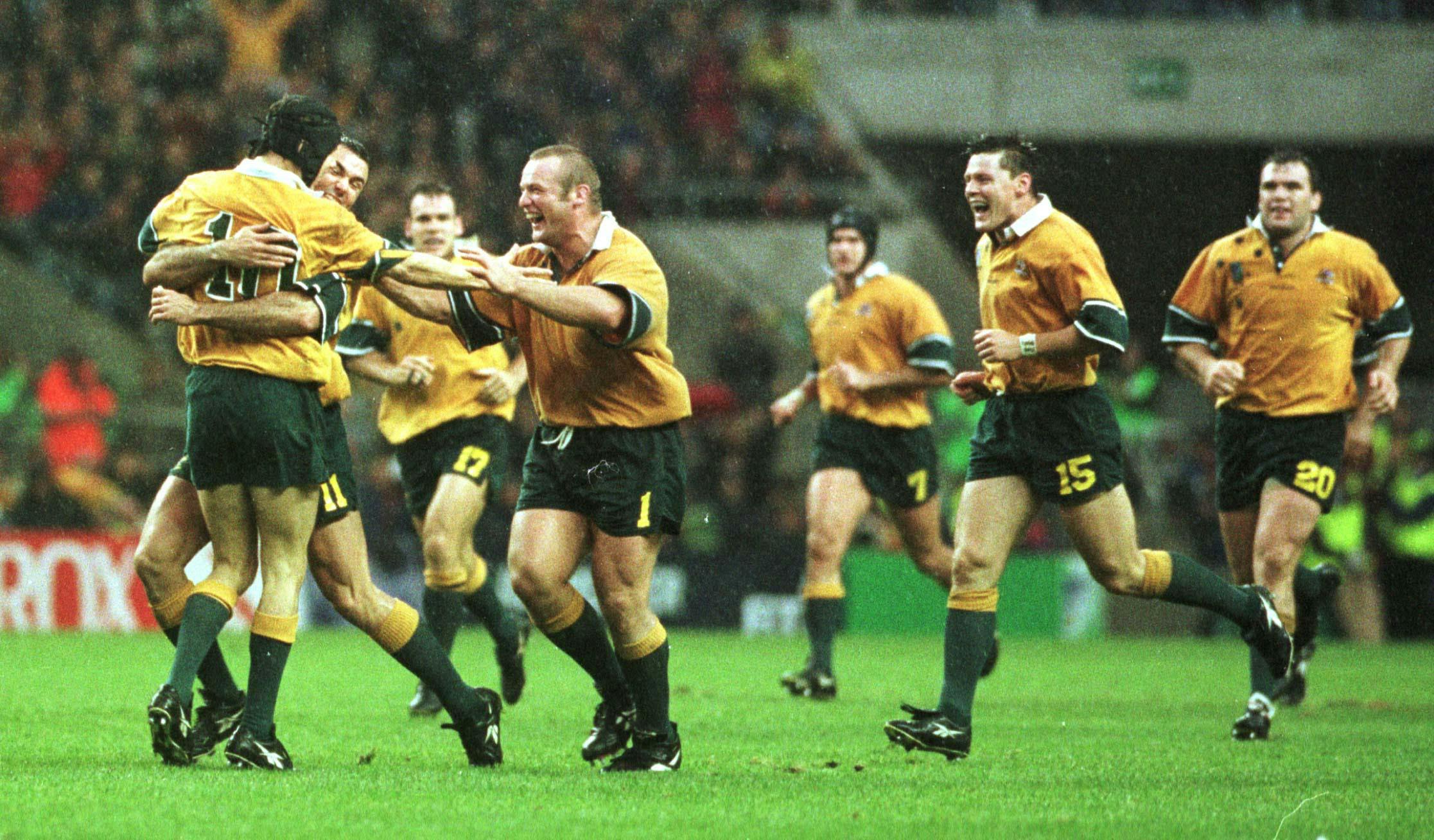Stephen James Larkham
- 51Age
- 102Caps
- 728Wallaby Number
Biography
Larkham was a skinny kid who began his rugby as a halfback but throughout his career punched well above his weight with boundless courage. He was modest, shy even, fiercely competitive, highly intelligent and a clever tactician. He had sublime passing skills, a ghost-like running style and an almost eerie sense of calm.
In 1995, Larkham was plucked from the second grade with the Canberra Kookaburras to represent the ACT and just a year later made his Test debut against Wales in Sydney. It was not until 1998 and his 13th Test that Rod Macqueen showed why he became the best coach in the game when he shifted Larkham to fly half for the Cook Cup Test against England in Brisbane. Larkham was a revelation as he scored three tries and had a hand in most of the other eight.
Larkham went on to be an integral part of many great Wallaby victories including the 1998 3-0 whitewash of New Zealand, the Rugby World Cup in 1999, Australia’s first two Tri Nations’ titles in 2000 and 2001 and the 2001 2-1 home series triumph over the British & Irish Lions.
Nonetheless, he will forever be linked with ‘that’ field goal. Under the intense pressure of a 1999 World Cup semi-final against South Africa at Twickenham, Larkham landed the most improbable dropped goal from near halfway to break the 21-21 deadlock in extra-time. The extraordinary thing about that field goal was not so much the distance, the angle or the pressure, it was simply that Larkham had never before kicked a field goal in senior rugby. His dropped goal has gone down in rugby folklore as the defining moment in the Wallabies’ victorious Rugby World Cup campaign.
Stephen Larkham played 102 Tests for Australia, a record 87 of them at No.10, in his illustrious twelve-year international career. It is no coincidence that his tenure coincided with the greatest era in Wallaby rugby history.
Highlights
1996Larkham won his first Test cap off the bench when he substituted Ben Tune on the right wing in the 42-3, 2nd Test defeat of Wales in Sydney. He later replaced Matt Burke at fullback.
1997
Larkham made his run-on XV debut at fullback in the 29-15, 1st Test victory over France in Sydney. He played 11 of the Wallabies’ 12 Tests, predominantly at No.15, although Larkham did have his first taste at fly-half when he replaced Tim Horan in the 18-33, 2nd Test loss to New Zealand at the MCG. Larkham scored his first test try in the 1st Test, 32-20 win against South Africa in Brisbane.
1998
Larkham played in all 13 Tests, 12 as the run-on No.10 and one - the Rugby World Cup qualifier against Tonga - as a replacement right winger.
1999
He dislocated his left knee cap against the Crusaders and as a consequence missed the entire domestic season and the Tri Nations tournament. Larkham returned for the Rugby World Cup, started in five matches at fly half, dropped his magnificent field goal in the semi-final against South Africa, and returned home a World Champion.
2000
Larkham started in the opening seven Tests but was rested for the Spring Tour. He delivered one of his finest performances in the inaugural Mandela Cup Test against South Africa in Melbourne. The Springboks led 23-17 at half-time, however Larkham turned the game on its head after the break. When Springbok centre Robbie Fleck rushed up out of the defensive line Larkham slid in behind him, outpaced the cover and strolled over to score under the posts. Then he ran wide and popped a short-pass to Daniel Herbert, who sent Jason Little over. Finally, a perfectly-weighted angled, chip kick into the in-goal allowed Stirling Mortlock score. Australia won 44-23. His was a virtuoso performance of the highest order.
2001
He earned nine caps in an injury interrupted season. Larkham missed the deciding 3rd Test against the British & Irish Lions and the opening Tri Nations international against South Africa due to damaged nerves in his right shoulder.
2002
Larkham won nine Test caps, eight at No.10 and one, against England at Twickenham, at fullback. He played his 50th Test against South Africa in Brisbane.
2003
A fractured elbow delayed Larkham’s start to the international season. He returned for the Tri Nations and was selected to his second Rugby World Cup where he started in six of Australia’s seven matches. Larkham picked up a total of 10 Test caps for the year.
2004
Larkham started at fly half in the opening 11 Tests only to miss the final international against England at Twickenham.
2005
Larkham was capped in each of the first six Tests but suffered a season-ending shoulder injury, one that required a complete reconstruction, in the 16-22, 3rd Test loss to South Africa in Cape Town.
2006
He was in the run-on XV for all 13 Wallaby Tests. Larkham played 11 Tests at fly half and two against Wales and then Italy - at inside centre when Mat Rogers was picked at No.10.
2007
Larkham played in seven of the opening eight Tests and won his 100th cap, against South Africa in Sydney. Larkham was selected to his third Rugby World Cup and completed the first pool game against Japan unscathed. The day before the second pool match against Wales he chipped a bone spur off his femur practising kick-offs. Twenty four hours later Larkham had an operation to remove the spur. A week on Larkham needed another operation to clean out an infection that had developed in the knee, the recovery from which meant he missed the rest of the tournament.
